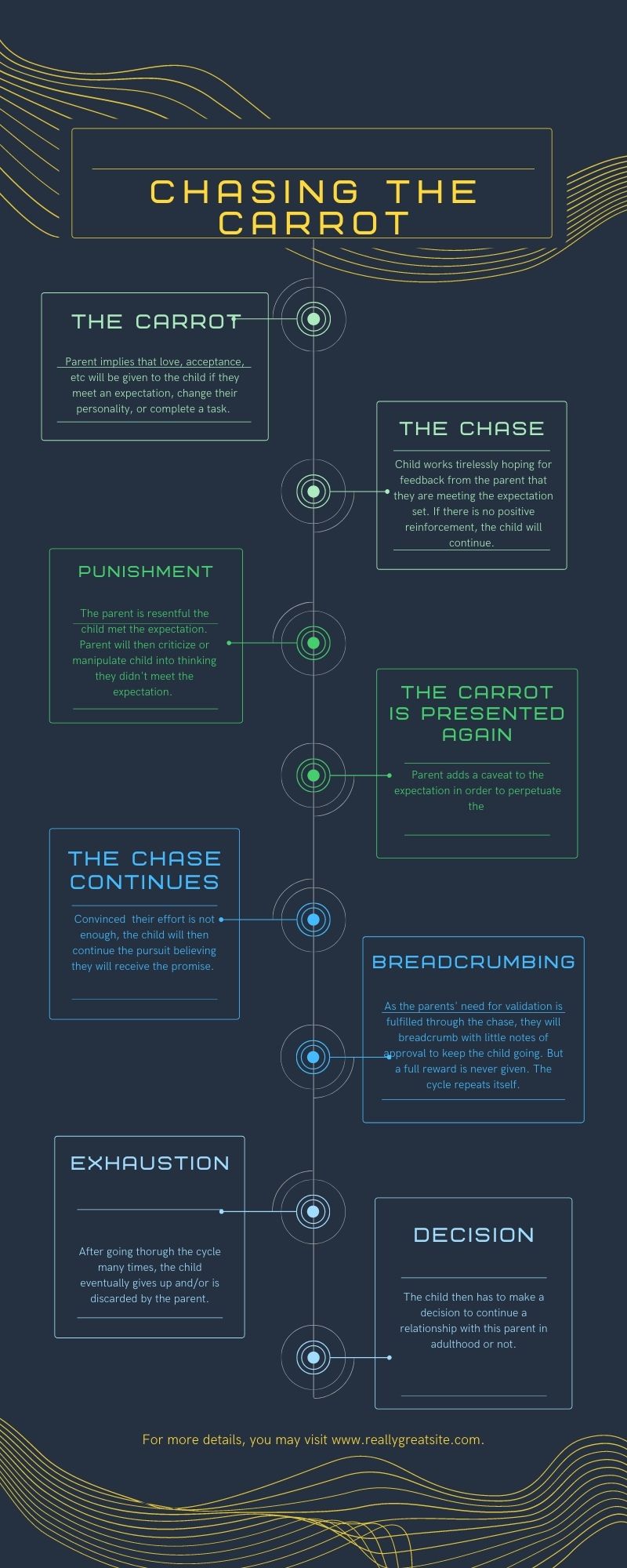View this post on Instagram
On TikTok, there are hundreds of videos that talk about the Law of Attraction with mantras like “Don’t chase…just attract.”
While there is wisdom behind this saying, there is also a massive iceberg of unexplored awareness of the driving force behind the act of chasing sitting below the surface.
It is easier to tell individuals who are seeking improvement and abundance to just stop chasing, and many dedicated people are desperately doing their best to keep that need to chase at bay. Those who believe that rewards come to those who work hard and do all the right things were most likely in homes where their hard work, honesty, and efforts were properly rewarded in healthy and appropriate ways.
They do not need to stress over the outcome because they have been conditioned through healthy and effective parenting that their efforts and personality are due their just rewards.
Unfortunately, there are those who have worked hard their entire life and have only received the bare minimum for it. Individuals who experience this often come from homes where there was unhealthy and ineffective parenting. Messages of unworthiness, love is an illusion, and efforts are fruitless are very real to those who have grown up in these homes. When messages like, “Don’t chase, just attract” are raining down in a hailstorm of social media posts, no one is more justified to cringe at this statement than those who have had no choice but to chase their entire lives. It is necessary to explore the behavior that drives chasing so we can rearrange our neural pathways into avenues leading to health, success, and abundance.
Before we explore this topic deeper, I want to add a note: we do not explore our behaviors in order to justify inappropriate actions, words, or treatment toward others. We explore our subconscious beliefs and attitudes in order to neutralize the dark energy that has fueled them, own responsibility for our actions and consequences, and then grow from them.
That is the purpose of exploring our minds: to grow, improve, and create healthier patterns.
Second, we look at the conditioning we have unconsciously subjected ourselves to in order to update our cognitive software. When we see that much of our behavior was a result of our initial conditioning from childhood, we can debug those neural pathways, erase the programming, and update it with a new and improved version of our thinking.
I highly recommend Ryan A. Bush’s, Designing the Mind: The Principles Behind Psychitecture and Self-Mastery. His approach to improving the mindset has helped me make my own journey much more efficient.
The struggle for power has been a paramount feature in relationships since the beginning of time. Humanity has gone through phases where the matriarchy held the power, then it was the patriarchy, and who knows what it will be 100 years from now. The point being, is that the assertion for dominance plays a role in the human experience, and this is something we cannot escape.
Unfortunately, this need for power can turn abusive in family dynamics and in adult relationships.
When this happens, the individual, be they a child or an adult, will find themselves attempting to chase the proverbial carrot the dominant individual dangles in front of them. That carrot represents all of the love, validation, support, safety, and security the more subservient individual is craving.
I’m going to focus on children in this dynamic because adults often find themselves in these same dynamics due to this pervasive conditioning. As we understand what we were chasing as children and why we had to chase that carrot, then we can review our assets to see that we no longer need to chase anymore.
Children are not equipped with the resources necessary to develop the amount of self-sufficiency one needs in order to just walk away when trapped in an abusive or neglectful situation. In fact, children who are neglected or abused tend to create this on their own in one way, shape, or form. Children will grow up to do one of two things:
1. Walk away because they come to terms early on that they have to be everything they need.
2. They continually engage in this cycle until they reach a point where they develop an awareness of what they are doing and change or unfortunately never change remaining trapped in the cycle.
The abuse/neglect cycle is vicious and is generally a product of the parents’ conditioning and upbringing. There are anomalies, but in most cases, it is safe to say that it is generational conditioning. The cycle begins with the parents’ need for love and validation which they so effortless attain from the natural bond between parent and child.
Then as the relationship becomes pathological, the parent then takes advantage of the child’s need for safety, security, love, validation, and affection by setting expectations the child can barely meet or is absolutely impossible to attain. The child innately understands their survival is 1,000 percent dependent upon that caregiver.
In their mind, they are thinking: if I meet expectation B, mom will love me.
The parents understand this, but refuse to give the child the positive reinforcement they should receive. Instead, the child is given punishment (i.e. resentful remarks, criticism for the way they met the expectation, and so on) or nothing in return.
Without realizing it, the child is asking themselves what they did wrong: if mom is not happy with me even though I met said expectation, I must have done something wrong, and I must do more to get her love.
Once the child has been punished or starved from the thing they worked to get, the parent will either breadcrumb or just start the whole cycle all over again.
There is nothing more psychologically damaging than placing expectations on an individual with either the implied hope or stated hope they will be rewarded…only to see that reward vanish into thin air or realize it was never there to begin with.
The long-term consequences of this conditioning are tragic.
Individuals tend to find themselves in relationships that play out these themes. Inferiority complexes are developed as adults internalize messages of unworthiness, or love is only for the lucky and beautiful. Most individuals do have that one friend who seems to chase and chase—be it partners, money, fame, success, and so on. This dynamic has also taught these individuals that love is on unequal terms, they certainly have no voice in the relationship, and they believe love and forward movement of the relationship is often on the terms of the person with the most power. Unfortunately, that individual is aware of all of this on some level…they are miserable and know they are, but without the proper insight or guidance to debug that bad programming, they are stuck in a pattern.
Now, as parents we need to set expectations for our children so they can grow, mature, and develop into healthy adults. And if your child meets those expectations, then by all means, celebrate that and validate your child’s efforts so they can learn how to see what it is they did. That is healthy. It is when we use love, approval, and validation as a bargaining, and there is no positive feedback, forgiveness, or reinforcement in return for meeting those expectations, that we find ourselves in abusive and emotional neglect territory. This is what we want to avoid. In an ideal world, love and acceptance are unconditional. Boundaries and tolerance of behaviors are purely conditional.
So, Rosemary, where’s the hope?
The hope is that by understanding our initial conditioning we can do the following. For those who came from supportive and healthy homes where physical, emotional, and mental needs were met with care, understand that there was never a need to chase, and it is easier to resonate with statements that say, “Just be and attract.” That is a gift you received, and it is beautiful you received it. But not everyone was given this gift, and it is fruitless to judge someone who was given a lot in life they never asked for.
For those who had to chase: the carrot was just an illusion. Always has been, always will be. You developed a strength during a time when you should have been cared for and nurtured, but the reality is that it did not happen that way. We can chase that fantasy of what could have been, but in the end, it was just another proverbial carrot.
When you are ready, you will begin to see that you are no longer dependent upon those who took advantage of your pure, unconditional love. You will be able to take stock of your assets and deficits without judgement, and you will understand the why behind your relationships and even professional endeavors. Once you develop this awareness, you will be able to make the healthy changes necessary for a better life.
It will take hard work, but now, you will see the fruit of your labors. You will begin to discover that what was not available to you as a child is available for you now. You will stop tolerating breadcrumbs, set healthy boundaries, and embark on a beautiful journey of liberation as you compassionately and courageously update your software on your terms.

~


 Share on bsky
Share on bsky




Read 0 comments and reply